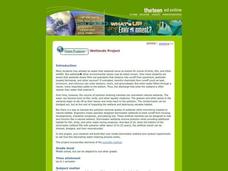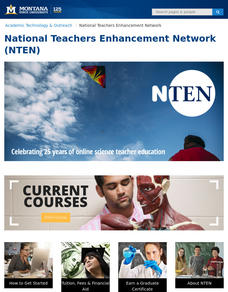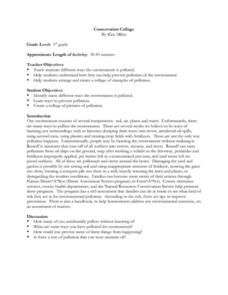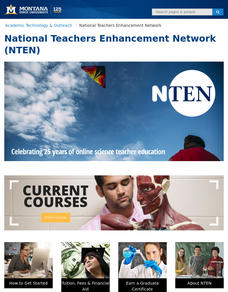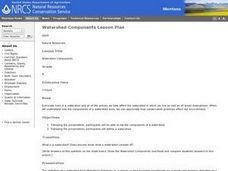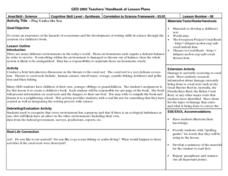Curated OER
Wetlands Project
Students discover how wetlands filter out contaminants before they can reach other bodies of water. In groups, they design and build a model of a stormwater wetland. They test the water quality and inform their classmates about the...
Curated OER
Foamie Fun Stuff
Students use foam pieces for matching games and other activities. In this foamie craft lesson, students make a foam pizza puzzle and other forms. Students use the foam shapes to do the puzzle or create the other forms.
Curated OER
The Water Cycle
Students create an "animated" water cycle wheel that illustrates where water comes from and where it goes.
Curated OER
Exploring Our Watershed System
Students examine how watershed systems are made up, and visit the Susquehanna watershed system and map out the system. They evaluate the order of watercourses in their area.
Curated OER
Conservation Collage
Learners identify many different ways the environment is polluted, and determine ways to prevent pollution. They create a collage of pictures describing how the earth becomes polluted.
Curated OER
Soils, Water and Erosion
Students participate in a hands-on experiment to compare how water and soil erosion affect soil and grass. They determine how slope affects erosion and how terracing affects erosion. They write a paragraph summarizing their data.
Curated OER
What Are We?
Students describe different types of water pollutants. They complete experiments in which they observe the affects of water pollution on algae. They also brainstorm and list three causes of each water pollutant.
Curated OER
Watershed Island
Students make a clay model and a geographic map of a watershed. They talk about the differences between the two representations and the potential human threats to watersheds.
Curated OER
State Of The Bay
Students investigate the environmental problems that surround the Chesapeake Bay area. They use an environmental handout as a resource that should be supplemented with research. Also students ask specific questions to report findings and...
Curated OER
Intro to Civil Engineering and Hydrology
Students identify the processes involved in the water cycle. In this math instructional activity, students explain what civil engineers and hydrologist do. They watch a video about flooding in Texas.
Curated OER
Acid Rain Keeps Falling On My Head
Young scholars measure the pH of local rain water. Students map the location of the collected rain water according to pH levels.
Curated OER
Go With the Flow
Students experiment with a simulated river bed and examine how erosion takes place faster with a young, fast-moving river than with a slow, older river.
Curated OER
Land Use and Nitrogen
Students consider the effects of development on water quality. They test nitrogen levels in waters before and after development, investigate wastewater treatment options and research best management practices to reduce nitrogen loads.
Curated OER
Do Human Practices Affect Water Quality?
Students determine if human practices have any noticeable effects on the quality of stream life as measured by the presence of certain macroinvertebrates. They collect, preserve and identify macroinvertibrate samples and quantify the data.
Curated OER
Red River of the North Flooding 1997
Students describe factors that affect the flow of rivers and explain their relationships. They research the factors involved in flooding events. describe the effects of present and future practices in land use, and river control methods.
Curated OER
The Five Finger Exercise
Learners understnad the importance of keeping our rivers and streams pollution free by remembering the major rivers of northeast Kansas. The see how the rivers contain particles of every substance that drains into them.
Curated OER
How Much Azatrine?
Learners understand the connections among people, places, and environments in the local school and community, Kansas and its surrounding states, the U.S. and its region, and the world.
Curated OER
Teaching about Conductivity
Young scholars explore conductivity and productivity in aquatic systems.
Curated OER
Water Quality and Temperature
Students are led through three activities to explore the effect of temperature fluctuations on the growth and survival of aquatic plants, clams, and shrimp eggs.
Curated OER
Watershed Components
Eighth graders examine the components of a watershed. They view overheads, discuss the hydrologic cycle, and observe a demonstration of a soil erosion box.
Curated OER
Play Under the Sea
Students explore the hazards of ecosystems and utilize their writing skills to create a studenT book. Threats to the ecosystem of the coral reef are discussed and used as a model for the research of the group.
Curated OER
Florida's Springs
Students follow the journey that water takes in aquifers and springs. They write about the major threats to the aquifer and the solutions to these threats.
Curated OER
Acid Rain
Students write paragraphs and color illustrations about acid rain. They color in where gases come from, where they mix, and where they return. They discuss where acids form in the atmosphere and list manmade sources of gases.
Curated OER
What is an Estuary?
Students define the terms estuary and watershed. They conduct an experiment to determine the density differences between fresh and saltwater. They examine the salinity distribution of the Peconic Bay Estuary.
Other popular searches
- Storm Water Runoff
- Contaminated Runoff
- Water Runoff
- Surface Runoff
- The Water Cycle Runoff
- Urban Runoff
- Rain Runoff
- Stormwater Runoff
- Water Cycle Runoff
- Algal Bloom Runoff
- Catfish and Runoff
- Polluted Runoff


